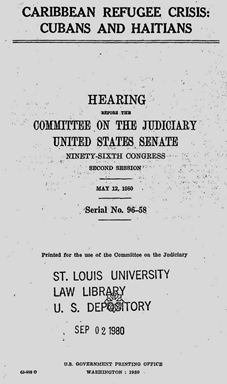"The Boat People" by Tekla Nicholas
Nicholas is a doctoral candidate in the Department of Global and Sociocultural Studies at Florida International University. Her dissertation will be on Haitian-American education in the United States.
Economic decline and political repression in Haiti under President Jean-Claude Duvalier led to a nationwide exodus. Haitians crowded into sailing vessels—most unseaworthy—to make the 720 mile journey to the United States, where they hoped to find refuge. An estimated 70,000 Haitian refugees arrived by boat between 1977 and 1981. Tragically, many perished on the way.
Although many went to the United States to escape political violence, the Ronald Reagan administration insisted that most were "economic migrants," who had no legitimate claim to asylum. Many Haitians who came to the United States were imprisoned and deported. As growing numbers of Haitians arrived by boat, the United States government sped-up deportations, hastily processing their asylum cases with little or no legal representation.
Individuals like Father Gérard Jean Juste and Ira Kurzban in the photo below argued that the American government’s policy was racist because it aimed to avoid an influx of black refugees. They also pointed out the hypocrisy when the United States welcomed refugees who fled Fidel Castro’s communist regime in Cuba. When civil rights leaders and other sympathetic political and religious groups protested, the United States government granted Haitians who arrived earlier than 10 October 1980 a temporary legal status under the new Cuban-Haitian Entrant Program. Later policies would provide some Haitians with the opportunity for permanent residence and eventual United States citizenship.
Since 1981 the United States Coast Guard has maintained an interdiction program to intercept vessels suspected of carrying unauthorized Haitian migrants. From 1981 to today, more than 118,000 Haitians have been detained. And most were repatriated to Haiti. While how many Haitians made it to American shores is unknown, these detention statistics suggest that many Haitians, even today, board boats with their sights set on the United States.

